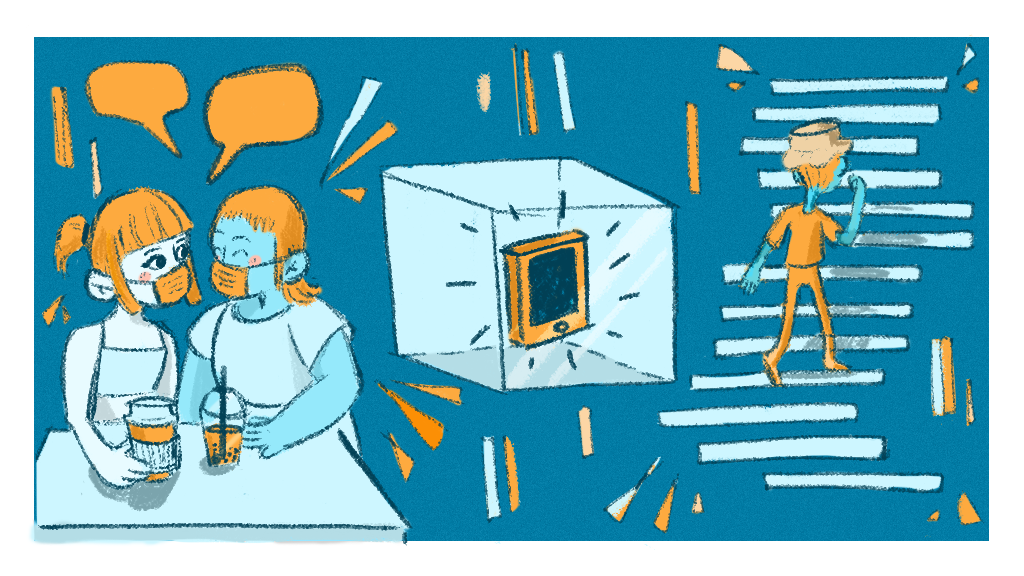Even though over a year has passed since the World Health Organization declared COVID-19 a global pandemic, there are still some aspects of our lives that may seem difficult to adjust to. For many, nothing has been easy this past year. Along with feeling disconnected from friends and loved ones, being home most of the time and having to continue school and work in such an unfamiliar format, it can feel almost impossible for students to maintain a healthy balance of it all.
Making Meaningful Connections
First year Computer Science major Alexander-Joseph Silva provided interesting insights on his experience coming to RIT in the midst of the pandemic.
Silva's recommendation for those struggling with college during COVID-19 was to make time to meet up with friends — even if it’s less frequently than normal — and establish social connections.
“As a freshman, go to club meetings anyways — even if it is hard. Make time to connect with people,” Silva stated. For Silva, that means working social time into his calendar to grab lunch with a friend. Making time to connect with others is just as important as every other aspect of your life. In other words, it is incredibly important to maintain social connections, even if it’s in a virtual format.
First year Business Administration: Finance student JP Queenan, also emphasized the importance of social connection. For Queenan, his biggest challenge is not going to classes in person.
“The biggest challenge is staying motivated for classes especially when you don’t physically meet your professors,” he stated.
Work-life-school balance is especially difficult to achieve when students have the ability to log in at any moment from the comfort of one's own home, making it challenging to create boundaries and disconnect from one thing to another.
Setting Boundaries
After speaking with Sara Engel, a health promotion coordinator at RIT, on the topic of working and school in the digital space, she provided some tips on how students can make this format work for them. Her first piece of advice is to set your own boundaries. It is crucial to set boundaries for yourself especially in a virtual work-school format, where there typically aren't.
She recommended that students identify boundaries for themselves using something they are currently struggling with as a guiding framework. For example, for students who have a tendency to get distracted by their phones, taking the time to turn it off or scheduling time to put it away may help prevent these distractions. In a virtual format, students spend a majority of their days in front of a screen, so this boundary can also help reduce screen time.
Whatever boundaries you may set, it is important to set them with intention. By being intentional, students may be more likely to follow through with these boundaries and maintain them.
Engel also offered advice on managing your workspace. For those who do most work at home, it is important to create a workspace that works for you, and that may differ from person to person.
"Define what your boundaries are as they relate to work and school. Does it work for you to do homework in your bed or is it better to have a designated work space?” Engel stated.
For some, working from bed has no impact on their productivity, while others may prefer working from their desk or even in their kitchen. Similarly, people are often a reflection of their environment –– if students have a messy or dysfunctional room or workspace, some are less productive and more easily distracted, while others thrive in a messy space. No matter how your workstation looks or functions, if students enjoy working and learning in that space, chances are they will be more focused and productive in it.
Engel’s final piece of advice — whether you are trying to manage school, work or a combination of both — is writing your thoughts, goals, worries, stressors and to-dos out on paper. Doing this is a helpful way to compartmentalize and stay organized. Once those thoughts are written down on paper, you have taken them from your mind and are able to visualize your thoughts, allowing you to better manage your time, de-stress and feel more capable of tackling the work.
“Find what works for you," Engel said. "Wellness is not just one thing, it is all aspects of wellness working together and it will take time to figure out what is working well and what you might want to change."
Taking It Step By Step
While these tips may sound like another to-do for your already busy schedule, working them into your routine can be beneficial for your overall productivity and mental health. Thinking of them as beneficial things to build into your day rather than tasks to add on can also make them feel more manageable.
For other helpful tips, wellness events and more, students can check out the Weekly Wellness Newsletter, which is sent out regularly by RIT Message Center.
By implementing these small changes in our day-to-day lives, we can attempt to strike a balance of work, school, social life and time to ourselves. Whatever the incremental changes you make may be, it is important to find what works best for you in your life. Make time for yourself, connect with others and know that you are not the only one struggling to achieve this balance.








